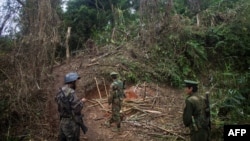An armed group fighting Myanmar's ruling military said it has taken control of a mining hub that is a major supplier of rare earth oxides to China, likely disrupting shipments of elements used in clean energy and other technologies.
Rare earth mining in Myanmar is concentrated in Kachin state around the towns of Panwa and Chipwe, adjacent to southwestern China's Yunnan province.
The Kachin Independence Army (KIA) took control of Panwa on Oct. 19, spokesperson Colonel Naw Bu told Reuters on Tuesday. It had previously captured Chipwe, according to local Myanmar media. Reuters was not able to independently verify the status of both towns.
The KIA is focused on managing the town of Panwa and has no current plans for rare earths or other economic issues, Naw Bu said.
He did not respond when asked whether the KIA is open to working with China on rare earths.
Previously, rare earth mining areas in Kachin state were under the control of militia group NDA-K, which is allied with Myanmar's junta government and welcomed payments from Chinese companies looking to establish mines.
Last year, Myanmar supplied China with about 50,000 metric tons of rare earth oxides (REOs) from ion-adsorption clays (IACs), eclipsing China's domestic IAC mining quota of 19,000 tons and making it the world's top exporter of heavy REOs, according to broker Ord Minnett.
"Rebel control of these mining sites could potentially disrupt rare earth concentrate shipments into China, which have declined for four months straight owing to the monsoon season and other challenges," research firm Adamas Intelligence said in a note on Monday.
China is the world's biggest consumer and importer of rare earth ores and compounds, which it uses to produce refined rare earth and magnets, industries it dominates.
Last month, China halted rare earth imports from Myanmar and suspended exports of ammonium sulphate used to leach rare earths there due to the conflict, said Ord Minnett analyst Matthew Hope.
"I expect the KIA plans to resume the REO business provided China is prepared to accept the exports and supply the technicians and ammonium sulphate. But I reckon it will expect payments before letting the companies do so," Hope said.
"Once the conflict passes, we expect financial deals with Chinese miners will be renegotiated, likely delaying restarts until early-2025," he said, adding that prices for REOs used in magnets are likely to rise as supply tightens.





